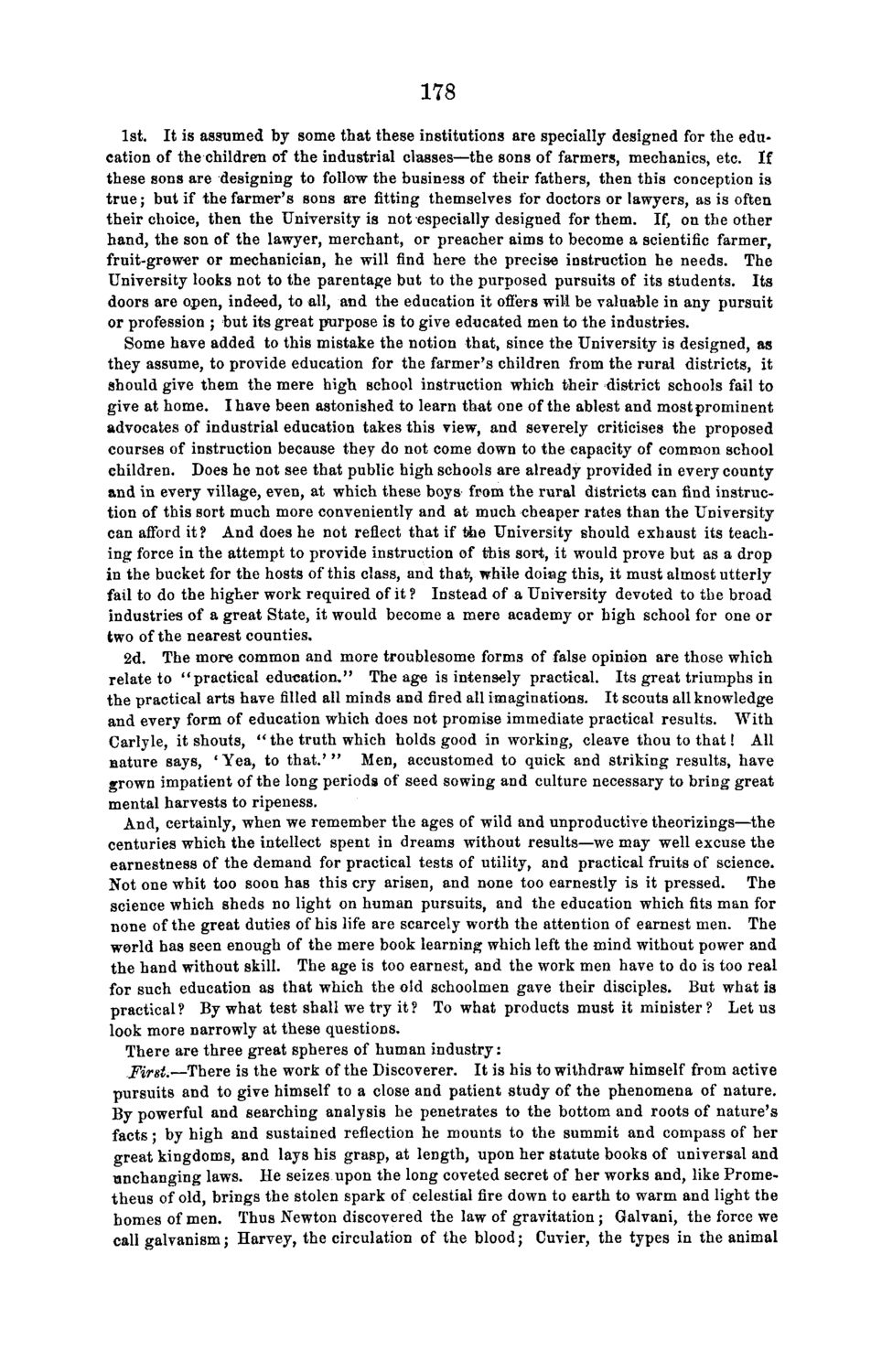| |
| |
Caption: Board of Trustees Minutes - 1868
This is a reduced-resolution page image for fast online browsing.

EXTRACTED TEXT FROM PAGE:
178 1st. It is assumed by some that these institutions are specially designed for the education of the children of the industrial classes—the sons of farmers, mechanics, etc. If these sons are designing to follow the business of their fathers, then this conception is t r u e ; but if the farmer's sons are fitting themselves for doctors or lawyers, as is often their choice, then the University is not especially designed for them. If, on the other hand, the son of the lawyer, merchant, or preacher aims to become a scientific farmer, fruit-grower or mechanician, he will find here the precise instruction he needs. The University looks not to the parentage but to the purposed pursuits of its students. Its doors are open, indeed, to all, and the education it offers will be valuable in any pursuit or profession ; but its great purpose is to give educated men to the industries. Some have added to this mistake the notion that, since the University is designed, as they assume, to provide education for the farmer's children from the rural districts, it should give them the mere high school instruction which their district schools fail to give at home. I have been astonished to learn that one of the ablest and most prominent advocates of industrial education takes this view, and severely criticises the proposed courses of instruction because they do not come down to the capacity of common school children. Does he not see that public high schools are already provided in every county and in every village, even, at which these boys from t h e rural districts can find instruction of this sort much more conveniently and at much cheaper rates than the University can afford it? And does he not reflect that if the University should exhaust its teaching force in the attempt to provide instruction of this sort, it would prove but as a drop in the bucket for the hosts of this class, and thai?, while doing this, it must almost utterly fail to do the higher work required of it ? Instead of a University devoted to the broad industries of a great State, it would become a mere academy or high school for one or two of the nearest counties. 2d. The more common and more troublesome forms of false opinion are those which relate to "practical education," The age is intensely practical. Its great triumphs in the practical arts have filled all minds and fired all imaginations. It scouts all knowledge and every form of education which does not promise immediate practical results. W i t h Carlyle, it shouts, " the truth which holds good in working, cleave thou to t h a t ! All nature says, ' Yea, to that.' " Men, accustomed to quick and striking results, have grown impatient of the long periods of seed sowing and culture necessary to bring great mental harvests to ripeness. And, certainly, when we remember the ages of wild and unproductive theorizings—the centuries which the intellect spent in dreams without results—we may well excuse the earnestness of the demand for practical tests of utility, and practical fruits of science. Not one whit too soon has this cry arisen, and none too earnestly is it pressed. The science which sheds no light on human pursuits, and the education which fits man for none of the great duties of his life are scarcely worth the attention of earnest men. The world has seen enough of the mere book learning which left the mind without power and the hand without skill. The age is too earnest, and the work men have to do is too real for such education as that which the old schoolmen gave their disciples. But what is practical? By what test shall we try it ? To what products must it minister? Let us look more narrowly at these questions. There are three great spheres of human industry: First.—There is the work of the Discoverer. It is his to withdraw himself from active pursuits and to give himself to a close and patient study of the phenomena of nature. By powerful and searching analysis he penetrates to the bottom and roots of nature's facts; by high and sustained reflection he mounts to the summit and compass of her great kingdoms, and lays his grasp, at length, upon her statute books of universal and unchanging laws. He seizes upon the long coveted secret of her works and, like Promet h e u s of old, brings the stolen spark of celestial fire down to earth to warm and light tbe homes of men. Thus Newton discovered the law of gravitation ; Galvani, the force we call galvanism; Harvey, the circulation of the blood; Cuvier, the types in the animal
| |